The role of women in rural development, food production and poverty eradication
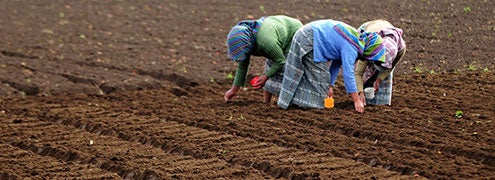
Photo: Maria Fleischmann / World Bank
Messages | Feature stories |Multimedia |Join the conversation
This week, UN Women marks three UN observances that reflect women's key role in development, beginning with International Day for Rural Women on 15 October, World Food Day on 16 October and International Day for the Eradication of Poverty on 17 October.
Rural women are key agents for development. They play a catalytic role towards achievement of transformational economic, environmental and social changes required for sustainable development. But limited access to credit, health care and education are among the many challenges they face. These are further aggravated by the global food and economic crises and climate change. Empowering them is essential, not only for the well-being of individuals, families and rural communities, but also for overall economic productivity, given women’s large presence in the agricultural workforce worldwide.
UN Women supports the leadership and participation of rural women in shaping laws, policies and programmes on all issues that affect their lives, including improved food and nutrition security, and better rural livelihoods. Training equips them with skills to pursue new livelihoods and adapt technology to their needs.
Women play a key role in food production and form a large proportion of the agricultural work force globally.
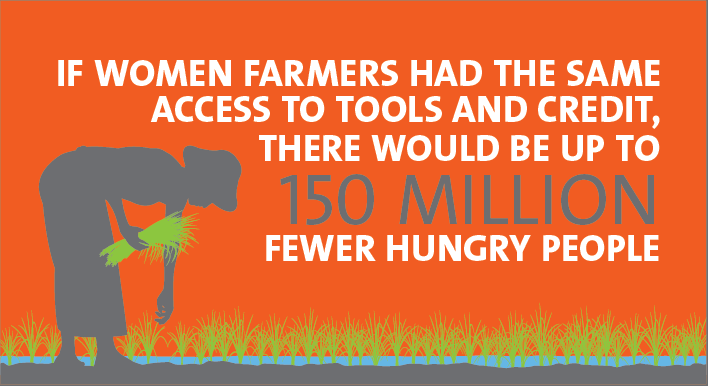
Given equal resources, women could contribute much more. FAO estimates that if women farmers (43 per cent of the agricultural labour force in developing countries) had the same access as men, agricultural output in 34 developing countries would rise by an estimated average of up to 4 per cent. This could reduce the number of undernourished people in those countries by as much as 17 per cent, translating to up to 150 million fewer hungry people.
According to new estimates, about 870 million people, or one in eight worldwide, did not consume enough food on a regular basis to cover their minimum dietary energy requirements over the period 2010 to 2012. The vast majority live in developing countries.
Many of the world’s most poor are women. Poverty eradication is a key challenge for rural women. New poverty estimates from the World Bank show that the proportion of people living on less than USD 1.25 a day fell from 47 per cent in 1990 to 22 per cent in 2010, across every developing region. Yet, 1.2 billion people are still living in extreme poverty.
Coordinated UN action
To help rural women escape poverty, in 2012 UN Women joined with the World Food Programme, Food and Agriculture Organization, the International Fund for Agriculture Development to launch a joint programme to empower poor rural women through economic integration and food security initiatives. The initiative aims to empower rural women to claim their rights to land, leadership, opportunities and choices, and to participate in shaping laws, policies and programmes.
Knowledge Gateway
During the High-Level week of the 68th Session of the UN General Assembly, UN Women, with support from the Government of Canada, launched the Knowledge Gateway for Economic Empowerment. The new online platform is an open global community for knowledge mobilization, innovation and partnerships. It seeks to re-vitalize women’s economic empowerment by building connections and bringing together people who need resources with those that have them. The portal will feature e-discussions, interviews, videos and other resources on rural women, food and poverty reduction from 15-25 October.
Message of UN Women Executive Director
Protecting rights of rural women crucial for gender equality, empowerment: UN Women Executive Director
Message by UN Women Executive Director Phumzile Mlambo-Ngcuka for International Day of Rural Women, 15 October, 2013 [Spanish] [French]
UN Secretary-General Ban Ki-moon's message on the International Day of Rural Women
Feature stories
The following stories reflect some of the work undertaken by UN Women and its partners to advance opportunities for rural women, alleviate poverty and improve sustainable development.
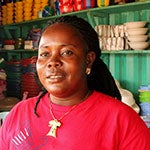
From vendor to cross-border trader:
“My business is expanding my world”
A comprehensive programme to promote women’s literacy, business skills, entrepreneurship and savings, is transforming the lives of over 20,000 rural women in Liberia.
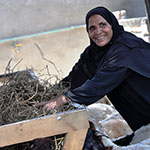
First women’s cooperative in Egypt changing lives and lands
A cattle-raising cooperative in Luxor has secured decent jobs and working conditions where 26 women earn an income and are the primary decision-makers on land and the division of labour.

Reaching out with public services across rural Moldova
Offering advice on the job market, agriculture and land laws, the innovative “one-stop shop” model has already helped more than 10,000 women and men, primarily in Moldova’s countryside.
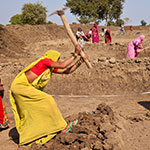
Changing the landscape with all-women worksites in India
Rural women are now able to demand work, manage worksites and ensure wages are paid, largely due to a project that has reached over 30,000 women in 69 villages in northern India.
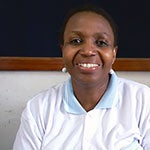
Pooling resources for local development: Tanzanian women take matters into their own hands
In the southern highlands of Tanzania, women entrepreneurs are gaining economic independence and access to decision-making after creating a Food Processing Trust.
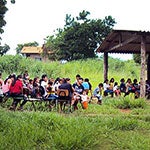
Aty Cuña: Indigenous women's assemblies tackling cases of violence and rights violations
On the Brazil-Paraguay border, women leaders of the indigenous Guarani-Kaiowa and Ayoreo communities are organizing themselves to protect their rights and have a say through dynamic women’s assemblies.
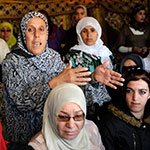
In Morocco, encouraged by success, Soulalyates women make strides in land rights
With the help of leadership training, rural women of the Soulalyates ethnic group enhanced their advocacy for property and land ownership rights, cemented in a 2012 ministerial ruling.
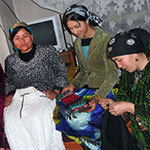
Tajikistan rural women gain business skills and independence through self-help groups
A UN Women-supported project is training the families of migrants and rural women’s groups to start their own businesses, helping them access micro-credits, and fostering their economic empowerment.
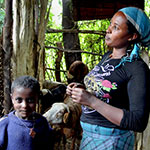
New Horizons: Ethiopian women join efforts to escape poverty
Impoverished women are earning an income, developing new skills, and starting collective savings thanks to a nation-wide economic empowerment programme benefitting approximately 10,000 women in the Ethiopian countryside.
Multimedia
Recognising the Contribution of Rural Women (South Africa)
This video from UN Women South Africa outlines some of the hardships, and daily victories, of rural women. It also details the crucial role the Rural Women's Movement plays, with UN Women's support, in working to change the lives of the rural women of KwaZulu-Natal.
Claiming their Space
India’s Mahatma Gandhi National Rural Employment Act (MGNREGA) programme - which guarantees at least 100 days of employment a year for adult members of rural households willing to do unskilled manual work for the minimum wage of 120 Indian rupees (USD 2.00) per day - provides decent work for rural women. The result is a growing population of empowered women. UN Women provides technical support to the popular public works programme.
Through its Fund for Gender Equality, UN Women also supported the Dalit Women’s Livelihood Accountability Initiative, which aimed to spur women’s participation in states where participation had not yet reached the one-third threshold and to ensure the timely pay of women workers. This effort provided 30,000 more rural women access to a livelihood.
Inspiring Aspiring Women in Agriculture
In early 2013, 100 women entrepreneurs and members of Joyful Women’s Organization (JoyWo), a local NGO in Eldoret, Kenya were brought together with UN Women’s support to expand their business and finance skills. The women, who are mostly poultry farmers in rural Kenya, plan to put their newfound knowledge to grow their own businesses and to share what they've learned with other women.
Guatemala: Farmers' Association Leader Confirms Need To Empower Rural Women
Doña María Elena Pop, leader of the Pocomchí Farmers' Association in Guatemala, speaks about the importance of supporting women's associations and highlights the work of United Nations agencies in this area. Her association has already benefited from a joint project involving UN Women and the Rome-based agencies, World Food Programme, Food and Agriculture Organization and the International Fund for Agricultural Development. The project, "Accelerating Progress Towards the Economic Empowerment of Rural Women", aims to improve food security and nutrition for women farmers, while helping them boost their income through advanced farming techniques.
Join the conversation
Join the online conversation on the International Day of Rural Women! Use the hashtag #ruralwomen on Twitter to share your thoughts.
Change your Facebook cover photo: Download image
Share this Factograph: Download image
Sample tweets:
On Int’l Day of #ruralwomen @phumzileunwomen calls for the protection of their rights --crucial for #genderequality http://owl.li/pK8aD
“43%of rural ppl who work in agriculture r women,yet too many #ruralwomen r denied access 2land”- @phumzileunwomen http://owl.li/pK8aD
"My business is expanding my world"-programme on biz skills transforms lives of #ruralwomen in #Liberia http://owl.li/pK8sv v @un_women
#Moldova:1-stop-shop offers advice on job market &agriculture laws to #ruralwomen; already helped 10,000+ http://owl.li/pK8Eb v @un_women
#India: All-women worksites let women demand work, manage worksites & ensure wages are paid http://owl.li/pK8GI v @un_women #ruralwomen
#Tanzania: #ruralwomen gain econ. independence& decision-making after creating Food Processing Trust. http://owl.li/pK7RK v @un_women
#AtyCuña: #Indigenous women’s assemblies tackling cases of violence & rights violations. http://owl.li/pK7OA v @un_women #ruralwomen
#Morocco: #ruralwomen in morocco made strides in land rights w/ help of leadership training http://owl.li/pK7LB v @un_women
#Tajikistan: #ruralwomen learn business skills & independence in self-help groups http://owl.li/pK7Jq v @un_women
#Ethiopia: #ruralwomen are playing a key role to #endpoverty http://owl.li/pK7Gs v @un_women
Sample Facebook messages:
15 October is the International Day of #RuralWomen! “We must enforce and protect the rights of rural women. When women have access to land, there are improvements in household welfare, agricultural productivity and gender equality.” – [@UN Women] Executive Director Phumzile Mlambo-Ngcuka. Read her full message: http://owl.li/pK8aD
Rural women play a catalytic role in the achievement of transformational economic, environmental and social change. On the International Day of #RuralWomen, [@UN Women] calls for action on the glaring inequality of women in the agricultural workforce and is developing programmes that empower rural women worldwide. Find out more: http://ow.ly/uI8s4
Tweets about "#ruralwomen"Follow us
@un_women, @onumujeres, @onufemmes, @phumzileunwomen on Twitter
UN Women, ONU Mujeres, ONU Femmes on Facebook
UN Women on Google+
UN Women on Instagram
Rural women, food and poverty eradication days 2012
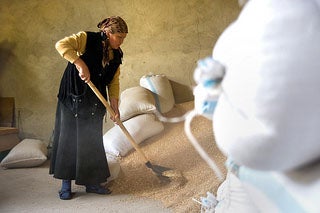
See our 2012 compilation for these three UN observances.